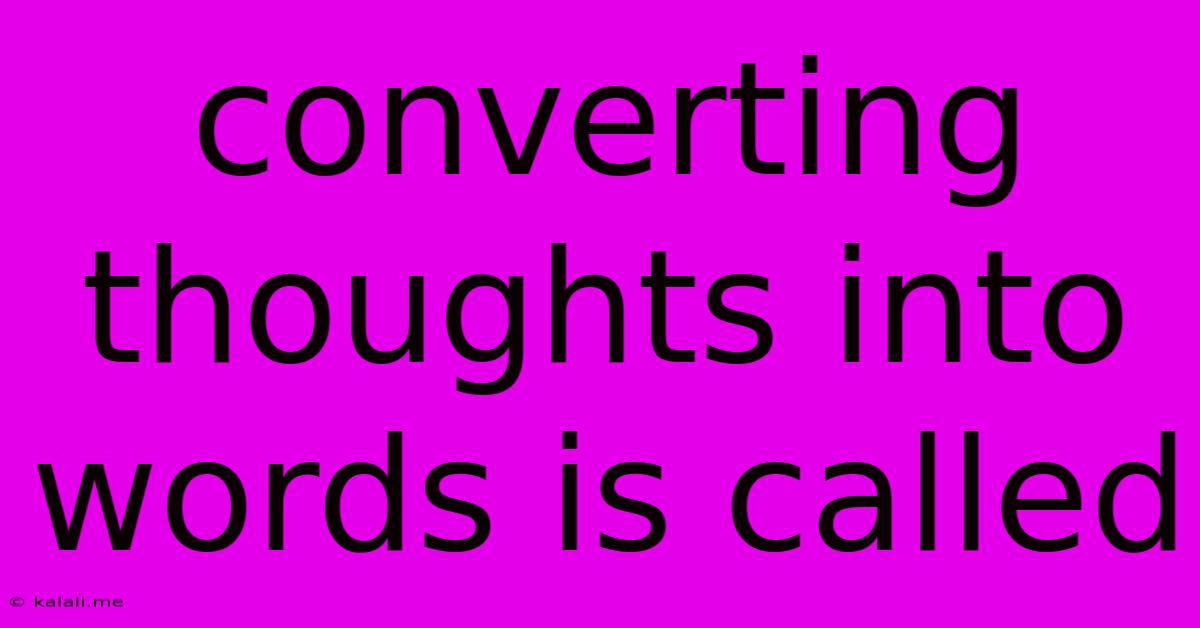Converting Thoughts Into Words Is Called
Kalali
Jun 15, 2025 · 3 min read

Table of Contents
Converting Thoughts into Words: Exploring the Process of Verbalization
Have you ever struggled to articulate a brilliant idea, a complex feeling, or a vivid memory? The ability to transform the abstract landscape of our thoughts into concrete words is a fundamental aspect of human communication and cognition. This process, while seemingly effortless at times, is a complex interplay of cognitive functions and a skill honed over years. But what is it actually called? There isn't one single, universally accepted term, but let's explore the nuances of this fascinating process and the various terms that describe it.
More Than Just "Speaking": Understanding the Nuances
While simply "speaking" might seem like the most straightforward answer, it's not entirely accurate. Converting thoughts into words encompasses a much broader spectrum of activities. It includes:
-
Verbalization: This term is often used to describe the process of expressing thoughts and ideas through speech. It's a more formal and precise term than simply "speaking," emphasizing the act of transforming internal mental representations into external linguistic expressions.
-
Articulation: This refers to the clear and effective expression of thoughts and ideas. It highlights not just the conversion of thoughts into words, but also the clarity and precision of the resulting language. Effective articulation involves choosing the right words and structuring sentences logically.
-
Enunciation: This focuses on the clear pronunciation of words. While it's a component of verbalization and articulation, it's more concerned with the physical act of speaking rather than the cognitive process of thought-to-word conversion.
-
Expression: This is a broader term encompassing the communication of feelings, emotions, and ideas through various means, including verbalization, writing, and nonverbal cues.
-
Lexicalization: This term, more commonly used in linguistics, refers specifically to the process of selecting words from our mental lexicon (our vocabulary) to express our thoughts. It highlights the crucial role of vocabulary and word choice in the process.
The Cognitive Processes Involved
Converting thoughts into words is not a passive process. Several cognitive functions work in concert:
-
Conceptualization: This is the initial stage where we form mental representations of our ideas and experiences.
-
Lexical Selection: This involves choosing the appropriate words to represent these concepts.
-
Syntactic Planning: This stage involves organizing the selected words into grammatically correct sentences.
-
Phonological Encoding: This final stage involves converting the linguistic plan into a sequence of sounds that we can articulate.
Improving Your Ability to Convert Thoughts into Words
While some people seem naturally gifted in this area, the ability to effectively convert thoughts into words is a skill that can be honed and improved. Here are some suggestions:
-
Expand your vocabulary: A richer vocabulary provides you with more options for expressing your thoughts precisely.
-
Practice active listening: Paying close attention to how others articulate their thoughts can help you refine your own skills.
-
Read widely: Reading exposes you to different writing styles and expands your understanding of language.
-
Write regularly: Writing helps you to clarify your thoughts and develop your ability to express them in words.
In conclusion, while there's no single perfect term, verbalization and articulation most accurately capture the process of converting thoughts into words. It's a complex cognitive and linguistic feat, essential for effective communication and a skill that can be continuously developed and refined. Understanding the components involved allows us to appreciate the intricate mechanisms behind this fundamental human ability.
Latest Posts
Latest Posts
-
Multiple Choice Questions On Endocrine System
Jun 15, 2025
-
How Many Main Colours Are There
Jun 15, 2025
-
The Perimeter Of A Rectangle Is 30 Cm
Jun 15, 2025
-
What Is The Lcm Of 14 And 24
Jun 15, 2025
-
The San Andreas Fault Is An Example Of A
Jun 15, 2025
Related Post
Thank you for visiting our website which covers about Converting Thoughts Into Words Is Called . We hope the information provided has been useful to you. Feel free to contact us if you have any questions or need further assistance. See you next time and don't miss to bookmark.